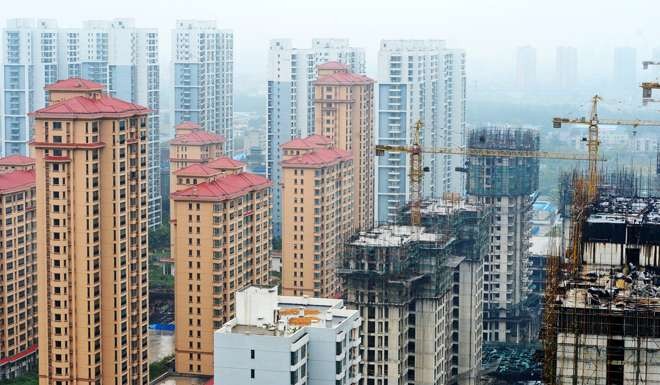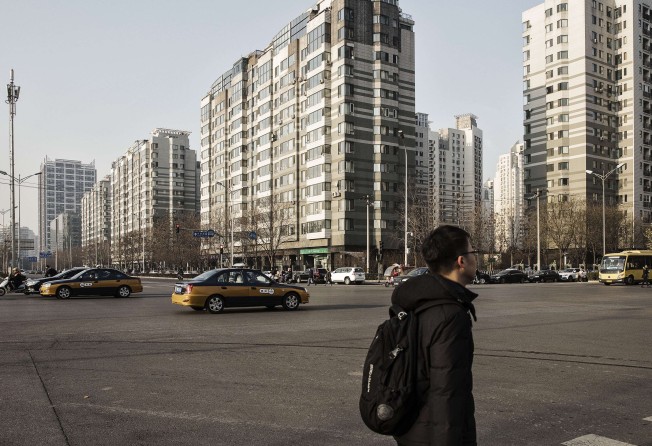
China’s property curbs seen giving mainland A shares a boost

An expected weak mainland Chinese property sector this year has heightened equity investors’ expectations that an influx of speculative capital will lift the stock market out of its doldrums.
Fund managers also believe a see-saw effect between the real estate and stock markets will be seen as governments at different levels are determined to knock down home prices.
“Stocks turn out to be safer bets than properties from now on since governments are taking a harsh stance on the real estate market,” said Wang Can, a retail investor with more than 10 years of stock investment experience. “The prospects are bright.”
Millions of retail investors in China are now stuck with paper losses after a stock market rout between mid-June and late August 2015 that wiped out US$5 trillion of capitalisation.
After a flat trading environment throughout 2016, many are keeping their fingers crossed that a strong rally will happen soon so they can cash in and exit from the market.
The benchmark Shanghai Composite Index is currently 40 per cent below its close on June 12, 2015. Since the start of the year it is almost unchanged, up only 3 points or 0.1 per cent.
UBS forecasts that mainland-listed firms as a whole would report 6 per cent year-on-year earnings growth in 2017, which in turn could support a 10 per cent rise in the key A-share indicator.

Owing to an economic slowdown, mainland-listed firms were expected to report only a small rise in earnings for 2016.
In the first quarter of 2016, they posted an average net income increase of 3 per cent.
As corporate performance this year is expected to be double that of 2016, investors see a ray of hope that an upward momentum in stock prices will also happen.
On the Shanghai Stock Exchange stocks are trading 16 times their 2015 earnings. The price-to-earnings (P-E) ratio represents just a third of the multiple in 2007 when the main gauge hit an all-time high.
Chinese authorities are now beset by fears of the bursting of a property bubble after housing prices surged to new highs amid a frenzied buying.
In major cities including Shanghai and Beijing, local governments rolled out a series of austerity measures to stem a home price increases.
A group of early housing speculators are considering shifting their focus from the mainland’s most developed metropolises to second-tier cities owing to the stricter policies limiting home purchases.
But analysts said authorities in second-tier cities could also step in to clamp down on the property sector if transaction volumes jump sharply.
A consensus prediction among analysts is that home prices will still rise in 2017, but that they will grow in an orderly and slower pace as the governments increasingly sees lofty home prices as a threat to long-term economic development and social order.
“As enthusiasm surrounding property starts to wane, stocks – particularly those solid companies with low P-E ratios – will appear more attractive to investors,” said He Yan, a hedge fund manager with Shanghai Shiva Investment. “We should never underestimate the power of speculative capital in China.”

Between October 2014 and mid-June 2015, more than 2 trillion yuan worth of funds were estimated to have flowed through the grey financing channel to end up on the stock market.
Investors borrowed the money via the shadow banking system to buy stocks amid lax regulatory oversight, with the benchmark index soaring about 120 per cent before a selling stampede triggered a boom-to-bust cycle.
Indeed, mainland Chinese equities have been notoriously known as a speculators’ market since its debut in 1990. Investors regard liquidity as a barometer to gauge market sentiment.
They believe that swelling turnover is a sign that a bull run is taking shape.
Despite efforts by the China Securities Regulatory Commission (CSRC) to educate retail investors to buy stocks on valuation, small players still tend to ignore fundamentals while habitually chasing short-term gains.
Gao of UBS said potential monetary tightening by Beijing to deleverage an economy facing increasing financial risks could prevent the market from rising to quickly.
UBS also said that foreign institutions’ strong A-share buying could be expected as a result of the cross border stock connect programmes, with these transaction volumes likely to be more than double that of 2016. However, foreign investors would buy stocks based only on fundamentals.